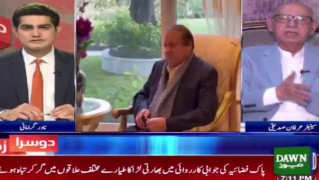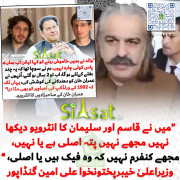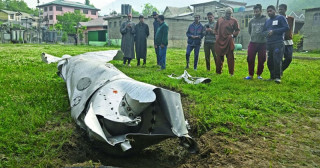Night_Hawk
Siasat.pk - Blogger
Snowden revelations may lead to spying curbs: experts
AFP

US intelligence leaker Edward Snowden. — File Photo
Published 2013-12-20 08:46:24
WASHINGTON: Intelligence leaker Edward Snowden's revelations about the scale of American eavesdropping have succeeded in triggering a fierce debate which could ultimately lead to limits on National Security Agency spying, experts say.
Snowden has been labeled a “traitor” by government officials but events this week signalled a possible vindication for the former computer contractor, who has always insisted he is a whistleblower trying to shed light on the NSA's secret surveillance.
Six months since a stream of bombshell revelations began pouring out from Snowden, members of Congress are proposing new laws to rein in the NSA, a federal judge ruled one of its programs is likely unconstitutional and a panel handpicked by the White House has called for sweeping changes to electronic surveillance.
It is “undeniable that we're having a series of debates about the appropriate limits of government surveillance that, without Edward Snowden, we would not be having,” said Stephen Vladeck, professor of law at American University. “If Snowden's goal was to spark a public debate I think he succeeded beyond his wildest dreams.”
Snowden, who has been granted asylum in Russia and faces espionage charges in the US, has expressed satisfaction that federal judge Richard Leon found the NSA's collection of Americans' telephone records probably violated privacy rights and that the snooping was “almost Orwellian” in scale.
“Today, a secret program authorized by a secret court was, when exposed to the light of day, found to violate Americans' rights,” Snowden said after Monday's ruling.
The most serious rebuke to the NSA came Wednesday from a panel of establishment figures named by the White House to review the surveillance operations that mushroomed after the attacks of Sept. 11, 2001.
The panel, which included a career spy who served as acting director of the Central Intelligence Agency, Michael Morrell, called for imposing limits on the NSA's powers, scaling back its secrecy and reforming the agency.
“We conclude that some of the authorities that were expanded or created in the aftermath of Sept. 11 unduly sacrifice fundamental interests in individual liberty, personal privacy, and democratic governance,” the panel wrote in its report issued Wednesday.
The panel also called into question claims from US spy chiefs that the dragnet of phone and Internet traffic has kept America safe, saying the spying “was not essential to preventing attacks.”
Privacy versus security
The panel warned that privacy rights outlined in the Fourth Amendment to the US Constitution should not be sacrificed in the name of preserving security, but also said the government had a duty to protect its citizens. The tension between those two principles is at the heart of the debate triggered by Snowden.
“I think the question is: what is the spirit of the Fourth Amendment as applied to the new technologies?” Vladeck said.
“That is the incredibly important and so far unanswered question looming behind the Snowden disclosures.”Even the Director of National Intelligence, James Clapper, reluctantly acknowledged in September that Snowden's leaks have generated a much-needed discussion about the parameters of eavesdropping.
More than a decade since the 9/11 attacks, the sweeping powers granted to the NSA by two successive presidents and lawmakers are now being re-examined, according to James Lewis, a former senior US official who worked on intelligence and cyber security.
“It's painful to say but yes, Snowden triggered long overdue thinking about how we engage in intelligence collection,” said Lewis, a senior fellow at the Center for Strategic and International Studies.
Snowden's leaks, however, also have damaged the US government's ability to gather intelligence and that will carry unknown risks, he said.
Snowden evokes mixed feelings among Americans.
According to a Washington Post-ABC News poll last month, only 35 per cent of Americans between the ages 18 to 30 say Snowden should be charged with a crime, compared with 57 per cent of those 30 and older.
Rights activists believe the leaks have opened up a rare opportunity to enact major reforms but it remains unclear where President Barack Obama will come down on the panel's recommendations.
For Snowden, the secrecy surrounding NSA spying represented a bigger threat than the surveillance itself.
“What we recoil most strongly against is not that such surveillance can theoretically occur, “ he wrote to Time magazine in an email interview, “but that it was done without a majority of society even being aware it was possible.”
http://www.dawn.com/news/1075280/snowden-revelations-may-lead-to-spying-curbs-experts
AFP

US intelligence leaker Edward Snowden. — File Photo
Published 2013-12-20 08:46:24
WASHINGTON: Intelligence leaker Edward Snowden's revelations about the scale of American eavesdropping have succeeded in triggering a fierce debate which could ultimately lead to limits on National Security Agency spying, experts say.
Snowden has been labeled a “traitor” by government officials but events this week signalled a possible vindication for the former computer contractor, who has always insisted he is a whistleblower trying to shed light on the NSA's secret surveillance.
Six months since a stream of bombshell revelations began pouring out from Snowden, members of Congress are proposing new laws to rein in the NSA, a federal judge ruled one of its programs is likely unconstitutional and a panel handpicked by the White House has called for sweeping changes to electronic surveillance.
It is “undeniable that we're having a series of debates about the appropriate limits of government surveillance that, without Edward Snowden, we would not be having,” said Stephen Vladeck, professor of law at American University. “If Snowden's goal was to spark a public debate I think he succeeded beyond his wildest dreams.”
Snowden, who has been granted asylum in Russia and faces espionage charges in the US, has expressed satisfaction that federal judge Richard Leon found the NSA's collection of Americans' telephone records probably violated privacy rights and that the snooping was “almost Orwellian” in scale.
“Today, a secret program authorized by a secret court was, when exposed to the light of day, found to violate Americans' rights,” Snowden said after Monday's ruling.
The most serious rebuke to the NSA came Wednesday from a panel of establishment figures named by the White House to review the surveillance operations that mushroomed after the attacks of Sept. 11, 2001.
The panel, which included a career spy who served as acting director of the Central Intelligence Agency, Michael Morrell, called for imposing limits on the NSA's powers, scaling back its secrecy and reforming the agency.
“We conclude that some of the authorities that were expanded or created in the aftermath of Sept. 11 unduly sacrifice fundamental interests in individual liberty, personal privacy, and democratic governance,” the panel wrote in its report issued Wednesday.
The panel also called into question claims from US spy chiefs that the dragnet of phone and Internet traffic has kept America safe, saying the spying “was not essential to preventing attacks.”
Privacy versus security
The panel warned that privacy rights outlined in the Fourth Amendment to the US Constitution should not be sacrificed in the name of preserving security, but also said the government had a duty to protect its citizens. The tension between those two principles is at the heart of the debate triggered by Snowden.
“I think the question is: what is the spirit of the Fourth Amendment as applied to the new technologies?” Vladeck said.
“That is the incredibly important and so far unanswered question looming behind the Snowden disclosures.”Even the Director of National Intelligence, James Clapper, reluctantly acknowledged in September that Snowden's leaks have generated a much-needed discussion about the parameters of eavesdropping.
More than a decade since the 9/11 attacks, the sweeping powers granted to the NSA by two successive presidents and lawmakers are now being re-examined, according to James Lewis, a former senior US official who worked on intelligence and cyber security.
“It's painful to say but yes, Snowden triggered long overdue thinking about how we engage in intelligence collection,” said Lewis, a senior fellow at the Center for Strategic and International Studies.
Snowden's leaks, however, also have damaged the US government's ability to gather intelligence and that will carry unknown risks, he said.
Snowden evokes mixed feelings among Americans.
According to a Washington Post-ABC News poll last month, only 35 per cent of Americans between the ages 18 to 30 say Snowden should be charged with a crime, compared with 57 per cent of those 30 and older.
Rights activists believe the leaks have opened up a rare opportunity to enact major reforms but it remains unclear where President Barack Obama will come down on the panel's recommendations.
For Snowden, the secrecy surrounding NSA spying represented a bigger threat than the surveillance itself.
“What we recoil most strongly against is not that such surveillance can theoretically occur, “ he wrote to Time magazine in an email interview, “but that it was done without a majority of society even being aware it was possible.”
http://www.dawn.com/news/1075280/snowden-revelations-may-lead-to-spying-curbs-experts
- Featured Thumbs
- http://i.dawn.com/large/2013/12/52b3be4b9238c.jpeg







































